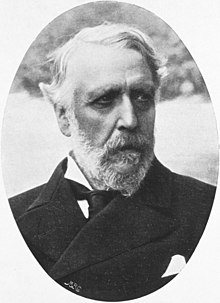William MacCormac
| Sir William MacCormac, 1st Baronet | |
|---|---|

Sir William MacCormac, 1st Baronet
|
|
| Born | William MacCormac 17 January 1836 Belfast |
| Died | 4 December 1901 (aged 65) Bath |
| Occupation | Surgeon |
| Language | English |
| Nationality | British Subject, |
| Education | Royal Armagh School, Queen's University |
| Spouse | Katherine Charters |
Sir William MacCormac, 1st Baronet KCB KCVO (17 January 1836 – 4 December 1901) was a notable British surgeon during the nineteenth and early twentieth centuries. MacCormac was a strong advocate of the antiseptic surgical methods proposed by Joseph Lister and he served in conflicts such as the Boer War. An advocate and pioneer of the Royal Army Medical Corps, MacCormac was perhaps the most decorated surgeon in Britain and he served as Serjeant Surgeon to Edward VII.
William MacCormac was born in Belfast, Ireland, the son of Dr Henry MacCormac, a notable Irish physician, and his wife Mary MacCormac (née Newsam), the daughter of a prominent Anglo-Irish family. Dr. Henry MacCormac was a well traveled physician and a lifelong proponent of the "open air theory" that stated that fresh air was conducive in order to prevent illnesses.
The MacCormac family was originally from County Armagh and descended from Cornelius MacCormac, a high-ranking Irish naval officer.
MacCormac studied medicine and surgery at Belfast, Dublin and Paris, and graduated in arts, medicine and surgery at the Queen's University, Belfast, in which he afterwards became an examiner in surgery.
He began practice in Belfast, where he became surgeon to the General Hospital, but left it for London on his marriage in 1861 to Miss Katherine M. Charters. In the Franco-Prussian War of 1870 he was surgeon-in-chief to the Anglo-American Ambulance, and was present at Sedan and he also went through the Turco-Servian War of 1876. He became in this way an authority on gunshot wounds, and besides being highly successful as a surgeon was a very popular in society, his magnificent physique and temperament making him a notable and attractive personality.
...
Wikipedia
